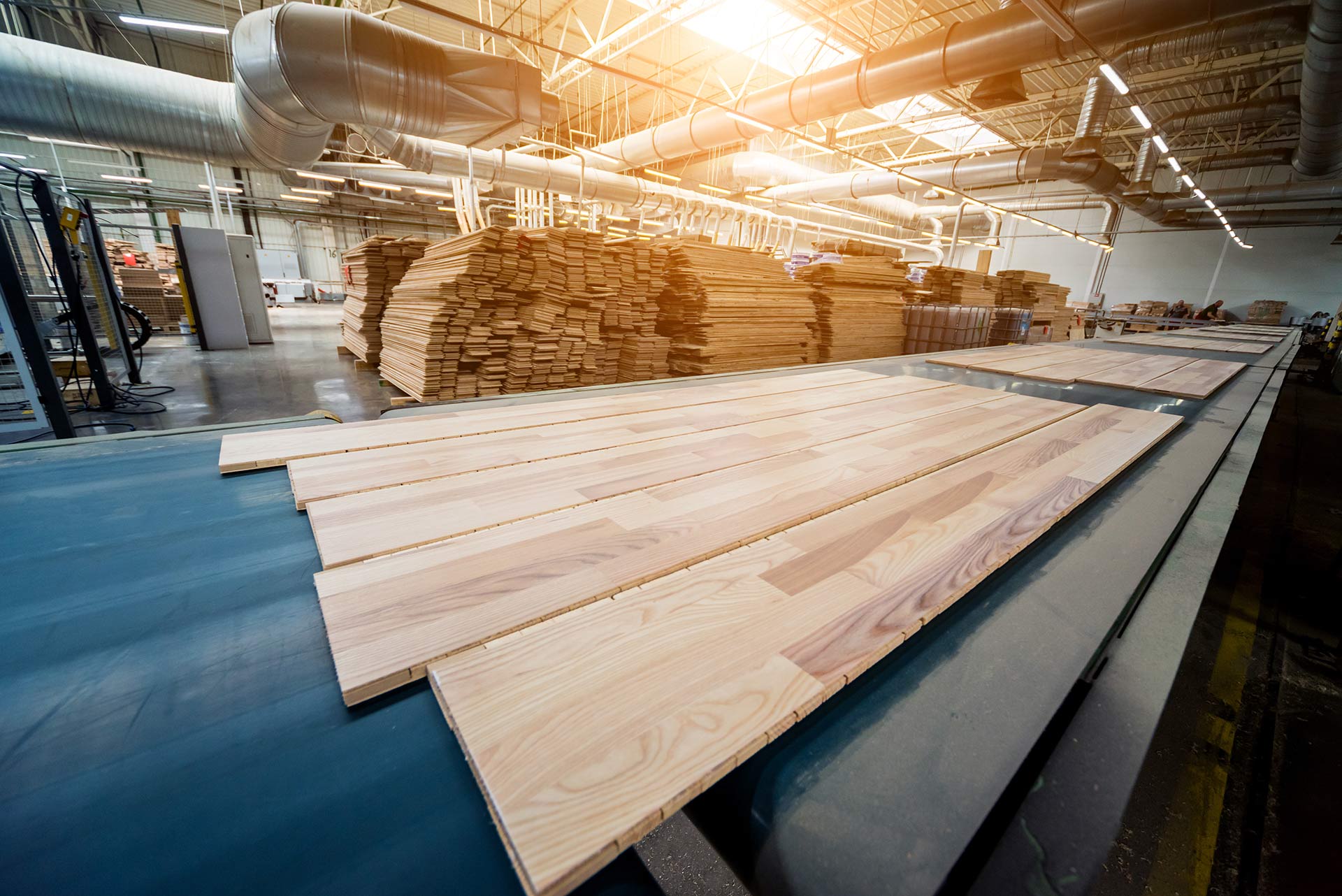Introduction to FSC and a sustainable wood industry
Sustainable development is an important topic for today’s society, and the wood industry is no exception. FSC (Forest Stewardship Council) is a global certification that aims to promote responsible and sustainable forest usage and wood industry worldwide. FSC is the only wood product certification that is also supported by major environmental organizations, such as WWF.
FSC plays an important role in ensuring that the wood industry is run in an environmentally, socially, and economically sustainable way. By maintaining high standards of certification, FSC helps preserve forest biodiversity, protect indigenous people, safeguard workers’ rights, and promote economic development in rural areas.
For consumers who are aware of sustainable consumption, FSC-certified products are a guarantee that they contribute to forest conservation and a sustainable future. For operators in the wood industry, FSC certification gives them credibility and contributes to their sustainability objectives. Let’s dive deeper into what FSC certification means, and why it is so important for a sustainable wood industry.

What is FSC certification?
FSC certification is a process by which an independent third party assesses and approves that an activity or product meets FSC’s standards for a sustainable wood industry. The certification covers the entire supply chain from the forest to the end product. To obtain FSC certification, forest owners, forest companies, and other actors in the supply chain must meet a number of criteria, such as respect for human rights and biodiversity conservation.
FSC certification also covers the social and economic aspects of forest use and the forest industry. This means that actors in the industry must work to improve and take into account the conditions of workers and local communities. It also includes ensuring that forest use and the wood industry are economically sustainable, and contribute to local development and employment.
To maintain traceability, the journey of an FSC-certified product from the forest to the final product must be uninterrupted. Therefore, each party in the supply chain must have an FSC certificate.
There are different types of certifications: forest management FSC certification, FSC chain of custody (CoC) certification, FSC trademark license, and controlled wood criteria (FSC Mix). Another component is the certification of ecosystem services, which offers organizations the opportunity to support ecosystem services such as recreation use of forests. It is also possible to obtain FSC project certification for construction projects.

FSC certification monitoring
Monitoring FSC certification is a key element of its reliability and effectiveness. Monitoring processes ensure that the standards and principles set by the FSC are met in the forest management and the wood industry. Monitoring has several levels:
First, there is self-regulation, where a certified company follows the FSC principles and criteria on its own initiative. This includes maintaining documentation, and monitoring and reporting activities.
Secondly, there is the verification by independent accredited certification bodies. These companies carry out audits throughout the production chain, from the forest to the final product, and evaluate the certified organization’s performance against FSC requirements. Audits can be regular or unannounced to ensure continuity in compliance with the standards.

Thirdly, FSC is involved in the monitoring. IT acts as the supervising certification organization, and is responsible for the overall integrity of the certification process. FSC monitors and supervises the audits carried out by certification bodies, and ensures that they comply with high standards.
In addition, FSC has a complaints mechanism that allows complaints to be filed if there is a suspicion of a breach of the standards. This increases transparency and accountability by allowing the possibility to check and address potential discrepancies or irregularities.
Overall, FSC certification is a multi-level system that ensures the commitment of certified organizations and forest owners to sustainability. Monitoring processes are essential to ensure the credibility of FSC and the reliability of certified products in the global market.
Benefits of FSC certification for the wood industry
FSC certification offers many benefits to the wood industry. First, it provides a strong market position and competitive advantage by meeting consumer and business demand for sustainable products. Consumers and businesses are increasingly aware of the environmental and social impact of their sourcing decisions, and they are looking for FSC-certified products as a way to promote sustainability. FSC provides a recognised and reliable way to demonstrate commitment to responsible forest management and sustainable wood use and processing. This helps companies build trust with consumers, investors, and stakeholders.
FSC certification can also provide access to new markets and business opportunities. Many companies and public organizations require their suppliers to be FSC-certified to ensure that they meet sustainability requirements. With FSC certification, wood industry operators can open doors to these markets, and benefit from new business opportunities.
In summary, the benefits of FSC certification for the wood industry are significant, because it
- it enhances reputation
- meets market demands,
- promotes sustainability,
- and can open up new business opportunities.
This encourages companies to commit to sustainable forest management, wood use, and processing, which is an essential step towards a more sustainable future.

FSC and the promotion of a sustainable wood industry
Forest Stewardship Council (FSC) certification is the key to biodiversity conservation and a sustainable wood industry. Certified products enable operators in the industry and consumers to actively participate in the conservation of forest biodiversity. Certification also has a positive impact on social responsibility, supporting workers, indigenous people, and local communities.
Conserving biodiversity
One of the main benefits of FSC certification is the conservation of forest biodiversity. By following the FSC’s forest management guidelines, forest owners can contribute to the maintenance and conservation of different ecosystems and species. FSC certification also contributes to the creation of protected areas, and preserves valuable habitats for endangered species. By supporting FSC-certified products, consumers can actively contribute to the conservation of forest biodiversity.
Promoting sustainable forest management
FSC certification promotes sustainability by setting strict guidelines and requirements for forest management. This includes ensuring that logging is carried out in a way that minimises negative environmental impacts. FSC certification also promotes sustainable practices, such as a certain number of trees in harvested areas. By following the FSC guidelines, one can ensure that the operations are carried out in a responsible and sustainable way.
Impact on local communities, indigenous people, and workers
FSC certification also has a positive impact on social responsibility. This means, among other things, that the industry must work for the benefit of workers, indigenous people, and local communities. FSC certification promotes social responsibility and respect for human rights. It protects indigenous people and ensures their participation in decision-making. FSC certification also contributes to the economic development of rural areas by encouraging job creation, and thus contributing to a sustainable economy in these areas. FSC also supports the implementation of the UN Sustainable Development Goals.
FSC and the global market for sustainable wood products
FSC certification also plays an important role in the global market for sustainable wood products. FSC certification allows companies to capitalise on the growing demand for sustainable products, and reach a wider customer base. Consumers and businesses around the world are increasingly aware of environmental issues, and demand products that come from sustainably managed and properly certified forests. By offering FSC-certified products, companies can position themselves as sustainable actors, and create a competitive advantage in the market.
FSC certification also gives credibility and reliability to companies in the wood industry. FSC certification allows companies to demonstrate that their products originate from sustainable sources, and comply with international forest management standards. This gives customers confidence in the company and its products, and can boost sales and profitability in the long term.

The Forest Stewardship Council (FSC) and other similar certification schemes have played a key role in building credibility around the sustainable sourcing and use of wood. This has increased consumer and business confidence and demand for FSC-certified products.
The global market for sustainable wood products covers a wide range of areas: from the building industry to paper, and from furniture to packaging materials. Demand for sustainable wood products has increased, especially in developed countries, where the ecological footprint and sustainability have been at the heart of consumer and business decision-making. FSC certification can open up new markets for companies, especially in countries and industries where responsibility and sustainability are a priority in consumer and business decision-making.
At the same time, the promotion of sustainable wood sourcing and certification has created opportunities for the wood industry to grow sustainably. Companies committed to sustainable forest management and wood use have been able to open up new markets and improve their reputation as environmentally conscious actors. FSC certification helps companies meet stricter regulatory requirements around the world. Many countries set requirements to ensure the origin and sustainability of wood products, and the FSC certificate often meets these requirements.
In the future, demand for sustainable wood products is expected to continue to grow as consumers and businesses place greater emphasis on environmentally friendly alternatives. This creates opportunities for both the wood industry and consumers to promote sustainable development and responsible use of wood worldwide.
Read more: How FSC Certification Aligns with EUDR Requirements
How can a modern system designed for the wood industry support FSC requirements?
In the wood industry, monitoring the traceability and accuracy of raw material origin information is a significant challenge, especially when sawmills and wood processors are supplied with raw materials from multiple sources and with different certificates. This complex process requires careful coordination and efficient systems to reliably document the origin of the wood and comply with all certification standards.
In addition, different certifications can add to the challenge, as their requirements and standards can vary, further highlighting the need for accurate data management and monitoring.
A modern ERP system, such as Timber by Pinja, can meet the challenge by providing information on, for example, the certificates of the raw material batches supplied and the proportion of certified wood. It is also possible to monitor the quantities and certifications of sawn timber by-products, i.e. chips and bark, using different calculation formulas. In addition, the system supports sales monitoring and enables accurate information on the proportion of certified wood in the sold products, for example, on a monthly basis.
Want to learn more about meeting FSC requirements with a software solution?
Use the form below to book a free remote meeting with one of our experts. Booking a meeting does not commit you to anything.
In the remote meeting, we can, for example, identify what your needs are in terms of traceability of origin, and how traceability could be facilitated in your company.

